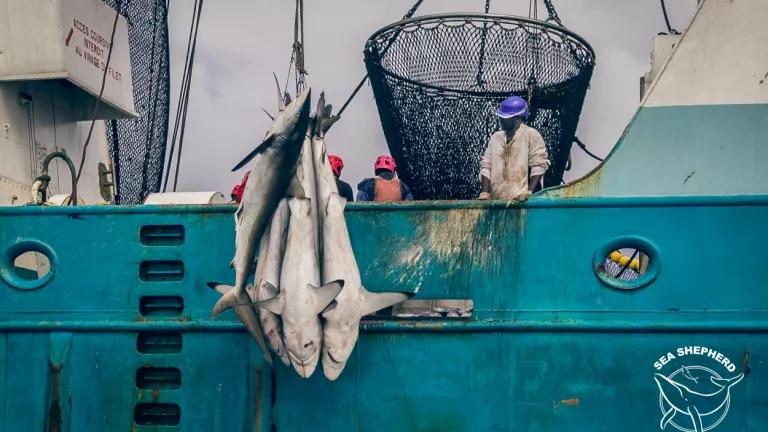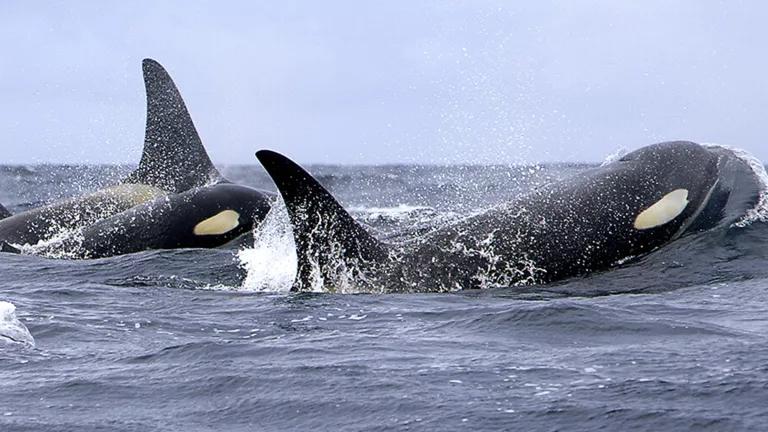NGOs Call for NOAA to Strengthen Seafood Import Standards

U.S. consumers face difficult decisions at the seafood counter these days. We’ve now learned that some seafood is caught by forced or trafficked labor—repugnant practices no moral person would wittingly throw their money behind. We know that some seafood is fraudulent or not what it claims to be. But did you know that up to one third of wild-caught U.S. seafood imports are harvested using illegal, unreported, and unregulated fishing practices (IUU fishing)?
IUU fishing is a type of fishing that drives overfishing, which threatens the world’s fish supply, honest fishermen’s livelihoods, and wreaks havoc on marine ecosystems. Roughly one year ago, a U.S. program intended to help remedy these ills came into effect. The program, called the Seafood Import Monitoring Program (SIMP), aims to close U.S. markets to IUU-fished and fraudulent seafood and is a major first step in the fight to combat IUU fishing. Yet, as detailed in a letter NRDC, WWF, Oceana, Greenpeace, Marine Conservation Institute, Monterey Bay Aquarium, and the Center for Biological Diversity sent to the National Oceanic and Atmospheric Administration (NOAA) on April 29, at the one-year anniversary of the program, NOAA needs to prioritize closing key implementation gaps and work toward expanding the program to include all imported seafood species. Without taking these crucial steps, the program will fall short of achieving its goal to prevent IUU fishing and fraudulent seafood from entering the United States.
The U.S. imports more than 80 percent of the seafood Americans consume, and in 2018, the United States was the world’s top seafood importing country. In 2016, a hefty ~5.79 billion pounds of edible seafood entered the United States. What these bewildering numbers mean is that the United States has enormous leverage to stamp out IUU fishing and seafood fraud—if the United States closes its coffers to IUU fished seafood. Fishermen who harvest their catches illegally do so because it’s cheaper than adhering to the rules. Conversely, if illegally-fished product can’t make it to a major market like the U.S., there will be less financial incentive to fish illegally. The SIMP aims to disincentivize IUU fishing and seafood fraud by shutting down U.S. commerce to these types of products.

The SIMP currently works by requiring full supply chain traceability for thirteen species groups of seafood. By having key information about when and where the fish was caught, the fishing vessel and type of gear used, and where transshipment and processing occurred, import officials have the information they would need to trace a seafood shipment back to its origin. If certain details don’t add up – for example, the shipment says that it’s albacore tuna, but the import documents report that the tuna was caught near the Aleutian Islands, which is outside of albacore tuna’s range—enforcement agents will know that there may be something fishy about the particular shipment. While having full supply chain traceability alone won’t solve IUU fishing, it is a prerequisite to ending IUU fishing. In the words of Guy Dean, President of Organic Ocean Seafood and 2018 winner of the Seafood Champion Award for Leadership, “you cannot have sustainability without traceability.”
However, as we mark the one-year anniversary of the SIMP, the program has room for improvement. In the letter sent to NOAA, our organizations detailed two key areas in which NOAA’s implementation of the SIMP is inconsistent with the program’s requirements and the key objective of ensuring that illegal or fraudulent seafood product is excluded from entry into U.S. commerce.
NRDC’s analysis indicates that at present, NOAA’s guidance to importers for data entries into the automated data system used to collect documentation do not clearly require importers to provide 1) the Authorization to Fish and 2) the Unique Vessel Identifier (UVI) at the time of import. If an Authorization to Fish sounds important, that’s because it is—it’s the permit or other document a country administers that permits the commercial fishing activity. It’s like having a driver’s license if you’re going to be operating a vehicle. The term Unique Vessel Identifier refers to a distinct number that sticks with a ship from the time of its construction until it no longer exists, like a human’s thumbprint. A vessel’s UVI is important to track and document because IUU fishing vessels will often repaint their hulls and christen themselves with a new name, thereby concealing their identities. Since a UVI is welded into a ship, it’s impossible to erase. Without requiring these two key data elements at the time of entry, NOAA is losing out on an opportunity to have real time access to these important pieces of information.
The letter also calls on NOAA to expand the SIMP to include all seafood species. At present, the program only covers 40 percent by volume and value of seafood imports to the United States. The lack of comprehensive coverage for all species within the SIMP is a serious impediment to ensuring that fish products entering the U.S. market are of legal origin. Illegal fishing and seafood fraud are pervasive problems that exist in virtually all foreign fisheries; they are not limited to the few species currently covered by SIMP.
The alarming 2019 Global Assessment Report on Biodiversity and Ecosystem Services, an initial summary of which was published this week, cited unsustainable fishing as the primary driver of marine biodiversity loss over the past 50 years. For humans to be able to continue relying on the oceans for food, the authors emphasize the critical importance of the cracking down on illegal fishing and of enforcement of natural resource laws that are already on the books. NRDC congratulates NOAA on the one-year anniversary of SIMP compliance. Looking ahead to this year, NOAA should implement the program to its full potential so that the United States can lead in stamping out the ills of IUU fishing. The health of the world’s fisheries depends on doing so.





